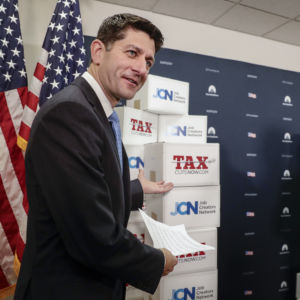This month, an NBC/WSJ poll of registered voters in swing congressional House districts found that a candidate’s support for the tax law passed in December might cost them in this November’s election.
Forty-two percent of voters were less likely to vote for a candidate who supported the tax law compared to 36 percent who said that they were more likely. That difference might seem small but in a highly competitive House race, it’s huge.
But it’s not at all surprising. On June 22, it will have been six months since Congress passed this hasty and ill-considered tax law. With each passing month, the truth about that law is sinking in:
—President Trump promised that the tax legislation would mean a $4,000 raise for the typical American family. We are now almost halfway through 2018 and that raise hasn’t shown up. That’s because the big corporations that got most of the $1.4 trillion tax cut have used the money to buy back their own stocks to benefit shareholders and corporate executives while increasing the national debt by as much as $1.9 trillion over the next 10 years.
—Small businesses were told that the tax law would increase consumer spending and thus increase demand for their goods and services. But because the vast majority of corporations have used their 40 percent tax cut for stock buybacks instead of giving their employees raises or investing in new products or plants, consumer spending in the first quarter of this year increased by only 1 percent, “the lowest increase in five years.”
—Voters still remember the Great Recession and don’t want a repeat. Steven Pearlstein, who won the Pulitzer Prize for commentary in 2008 for his columns anticipating and explaining the global financial crisis, is predicting that corporations using their tax cut windfall to buy back stocks are increasing corporate debt and inflating a financial bubble that, “when it bursts, will send the economy into another recession.”
Most voters are now realizing that the tax law gave them little but more national debt and the beginning of the next recession. And Main Street small business owners — skeptical of the law from the beginning — are incurring new costs to hire tax professionals to help them figure complicated new rules while having to compete against large corporations floating in cash from the tax giveaway, which is no way to invigorate our job creators.
There is still time to avoid the predicted recession if the new Congress elected in November revisits the tax reform, rolls back much of the 40 percent corporate tax cut and puts more money in the pockets of working Americans to increase Main Street consumer demand.
With a much smaller tax cut, corporations will still be internationally competitive. And the nation’s 300 million small business, 90 percent of which are not corporations, should get the same permanent tax cut as corporations instead of the temporary deduction on taxable income approved.
These congressional actions would create real wealth for our economy and citizens that will not explode the national debt and lead to a recession.

